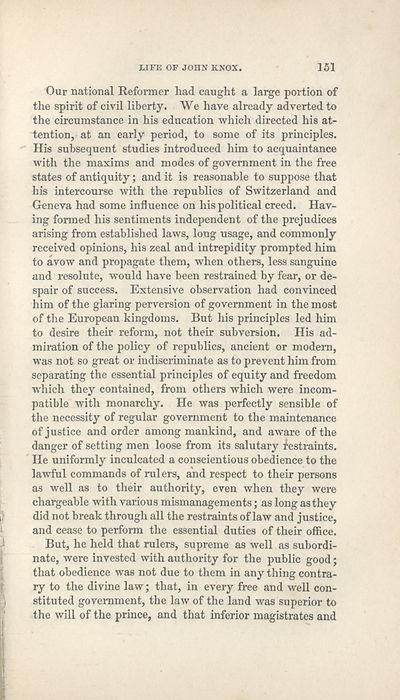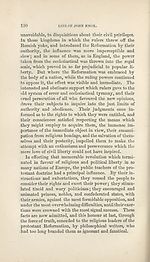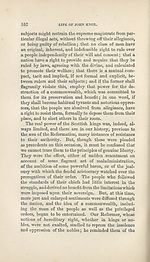Download files
Complete book:
Individual page:
Thumbnail gallery: Grid view | List view

LIFE OF JOHN KNOX. 151
Our national Reformer had caught a large portion of
the spirit of civil liberty. We have already adverted to
the circumstance in his education which directed his at¬
tention, at an early period, to some of its principles.
His subsequent studies introduced him to acquaintance
with the maxims and modes of government in the free
states of antiquity; and it is reasonable to suppose that
his intercourse with the republics of Switzerland and
Geneva had some influence on his political creed. Hav¬
ing formed his sentiments independent of the prejudices
arising from established laws, long usage, and commonly
received opinions, his zeal and intrepidity prompted him
to avow and propagate them, when others, less sanguine
and resolute, would have been restrained by fear, or de¬
spair of success. Extensive observation had convinced
him of the glaring perversion of government in the most
of the European kingdoms. But his principles led him
to desire their reform, not their subversion. His ad¬
miration of the policy of republics, ancient or modern,
was not so great or indiscriminate as to prevent him from
separating the essential principles of equity and freedom
which they contained, from others which were incom¬
patible with monarchy. He was perfectly sensible of
the necessity of regular government to the maintenance
of justice and order among mankind, and aware of the
danger of setting men loose from its salutary Restraints.
He uniformly inculcated a conscientious obedience to the
lawful commands of rulers, and respect to their persons
as well as to their authority, even when they were
chargeable with various mismanagements; as long as they
did not break through all the restraints of law and justice,
and cease to perform the essential duties of their office.
But, he held that rulers, supreme as well as subordi¬
nate, were invested with authority for the public good;
that obedience was not due to them in any thing contra¬
ry to the divine law; that, in every free and well con¬
stituted government, the law of the land was superior to
the will of the prince, and that inferior magistrates and
Our national Reformer had caught a large portion of
the spirit of civil liberty. We have already adverted to
the circumstance in his education which directed his at¬
tention, at an early period, to some of its principles.
His subsequent studies introduced him to acquaintance
with the maxims and modes of government in the free
states of antiquity; and it is reasonable to suppose that
his intercourse with the republics of Switzerland and
Geneva had some influence on his political creed. Hav¬
ing formed his sentiments independent of the prejudices
arising from established laws, long usage, and commonly
received opinions, his zeal and intrepidity prompted him
to avow and propagate them, when others, less sanguine
and resolute, would have been restrained by fear, or de¬
spair of success. Extensive observation had convinced
him of the glaring perversion of government in the most
of the European kingdoms. But his principles led him
to desire their reform, not their subversion. His ad¬
miration of the policy of republics, ancient or modern,
was not so great or indiscriminate as to prevent him from
separating the essential principles of equity and freedom
which they contained, from others which were incom¬
patible with monarchy. He was perfectly sensible of
the necessity of regular government to the maintenance
of justice and order among mankind, and aware of the
danger of setting men loose from its salutary Restraints.
He uniformly inculcated a conscientious obedience to the
lawful commands of rulers, and respect to their persons
as well as to their authority, even when they were
chargeable with various mismanagements; as long as they
did not break through all the restraints of law and justice,
and cease to perform the essential duties of their office.
But, he held that rulers, supreme as well as subordi¬
nate, were invested with authority for the public good;
that obedience was not due to them in any thing contra¬
ry to the divine law; that, in every free and well con¬
stituted government, the law of the land was superior to
the will of the prince, and that inferior magistrates and
Set display mode to:
![]() Universal Viewer |
Universal Viewer | ![]() Mirador |
Large image | Transcription
Mirador |
Large image | Transcription
| Antiquarian books of Scotland > Scotland/Scots > Life of John Knox ; and, The life of Alexander Henderson > (169) |
|---|
| Permanent URL | https://digital.nls.uk/131834332 |
|---|
| Description | Thousands of printed books from the Antiquarian Books of Scotland collection which dates from 1641 to the 1980s. The collection consists of 14,800 books which were published in Scotland or have a Scottish connection, e.g. through the author, printer or owner. Subjects covered include sport, education, diseases, adventure, occupations, Jacobites, politics and religion. Among the 29 languages represented are English, Gaelic, Italian, French, Russian and Swedish. |
|---|

